Journal Article
Publication Types:
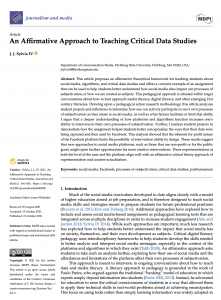
An Affirmative Approach to Teaching Critical Data Studies
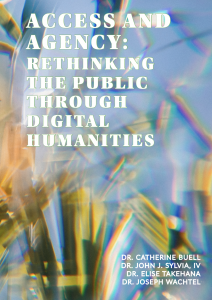
Access and Agency: Rethinking the Public through Digital Humanities
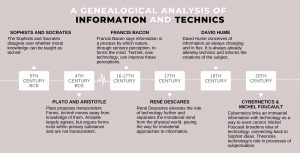
A Genealogical Analysis of Information and Technics
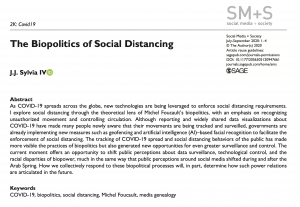
The Biopolitics of Social Distancing
In the course of the last decade, social media and digital technologies have been both celebrated as tools that can spread democracy and leveraged by authoritarian governments, such as those in China and Russia, to surveil and curtail protestors. As COVID-19 spreads across the globe, new technologies are being leveraged to enforce social distancing practices. This essay explores social distancing through the theoretical lens of Michel Foucault’s biopolitics, with an emphasis on recognizing unauthorized movement and controlling circulation.
On one hand, reporting on social distancing has made many people newly aware that their movements are being tracked and surveilled. For example, maps that grade and visualize how well particular geographic locations are doing at social distancing make clear that these organizations have access to large amounts of data about where people are moving. Seeing data used in such ways may raise new data-use concerns. On the other hand, governments are already implementing new measures that facilitate the enforcement of social distancing. The U.S. Center for Disease Control was given $500 million for the development of surveillance and data-tracking tools. Taiwan has implemented geo-fencing to ensure people stay at home, while Russia has actively used AI to perform instantaneous facial recognition as a way of monitoring quarantine and social distancing cooperation.
In this essay, I explore how the tracking of COVID-19 and social distancing practices have both made more visible the practices of biopolitics, but also generated new opportunities for even greater surveillance and control.
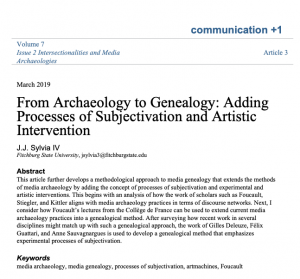
From Archaeology to Genealogy: Adding Processes of Subjectivation and Artistic Intervention
This article further develops a methodological approach to media genealogy that extends the methods of media archaeology by adding the concept of processes of subjectivation and experimental and artistic interventions. This begins with an analysis of how the work of scholars such as Foucault, Stiegler, and Kittler aligns with media archaeology practices in terms of discourse networks. Next, I consider how Foucault’s lectures from the Collège de France can be used to extend current media archaeology practices into a genealogical method. After surveying how recent work in several disciplines might match up with such a genealogical approach, the work of Gilles Deleuze, Félix Guattari, and Anne Sauvagnargues is used to develop a genealogical method that emphasizes experimental processes of subjectivation.
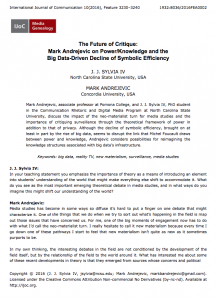
The Future of Critique: Mark Andrejevic on Power/Knowledge and the Big Data-Driven Decline of Symbolic Efficiency
Abstract
Mark Andrejevic, associate professor at Pomona College, and J. J. Sylvia IV, PhD student in the Communication Rhetoric and Digital Media Program at North Carolina State University, discuss the impact of the neo-materialist turn for media studies and the importance of critiquing surveillance through the theoretical framework of power in addition to that of privacy. Although the decline of symbolic efficiency, brought on at least in part by the rise of big data, seems to disrupt the link that Michel Foucault draws between power and knowledge, Andrejevic considers possibilities for reimagining the knowledge structures associated with big data’s infrastructure.
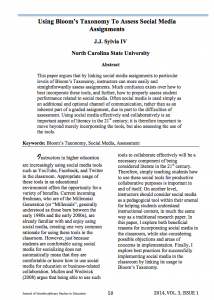
Using Bloom's Taxonomy To Assess Social Media Assignments
Abstract
This paper argues that by linking social media assignments to particular levels of Blooms Taxonomy, instructors can more easily and straightforwardly assess assignments. Much confusion exists over how to best incorporate these tools, and further, how to properly assess student performance related to social media. Often social media is used simply as an additional and optional channel of communication, rather than as an inherent part of a graded assignment, due in part to the difficulties of assessment. Using social media effectively and collaboratively is an important aspect of literacy in the 21st century; it is therefore important to move beyond merely incorporating the tools, but also assessing the use of the tools.
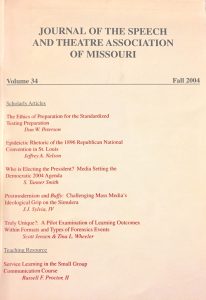
Postmodernism and Buffy: Challenging Mass Media's Ideological Grip on the Simulacra
Conclusion:
The popularity of BtVS is interesting because it goes against so many of the ideas present in traditional media. Is the popularity of the show due at least in some part to the postmodern emphasis that can be seen throughout? While the show may not be able to escape the simulacra, it can at least offer us a separate path, a different line of thinking from that of the rest of the media. Perhaps it has gained such attention from fans and philosophers alike because it spreads a message so different from the ones we are bombarded with by the rest of the media.
Presumably the media began presenting society with the ideas of heroes and true love and the binary opposition of good versus evil because that is what society wanted; that is what made the consumer purchase the media content. Yet, the popularity of BtVS seems to suggest that at least a very large portion of the American culture is willing to spend that money on ideas that have not been so traditionally popular in the media. Have postmodern ideas trickled down and been integrated into the American culture enough so that a show so seemingly different is not only successful but wildly popular? The widespread popularity of BtVS would seem to suggest just that. While the popularity of this show may not end the simulacra, it at least creates another framework of ideologies within that simulacra from which the audience may see life – a very postmodern effect in its own right.
